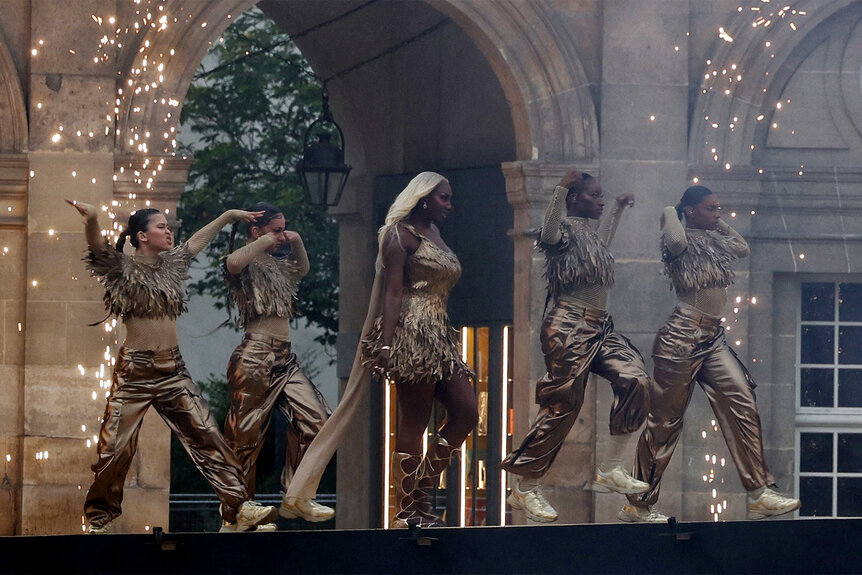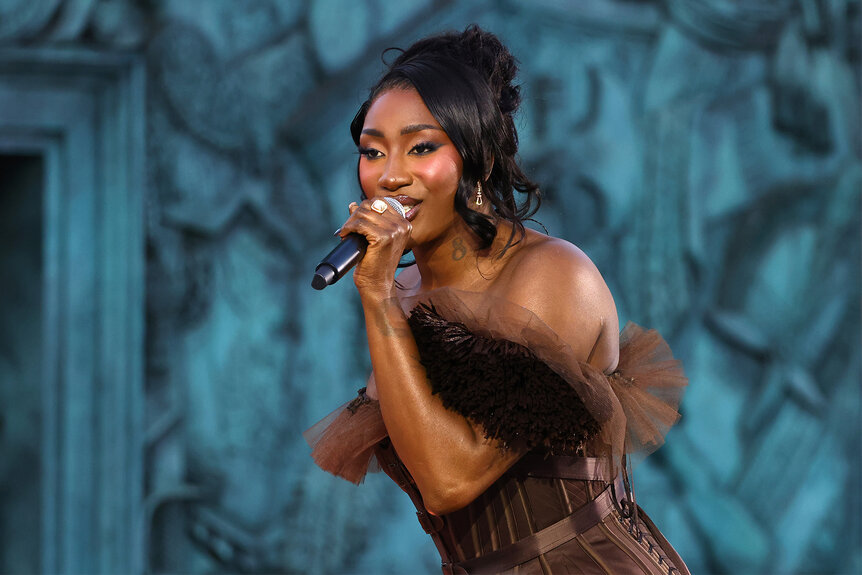Create a free profile to get unlimited access to exclusive show news, updates, and more!
Who Is Aya Nakamura? All About The Singer in Gold At The 2024 Olympics Opening Ceremony
Aya Nakamura is a huge French pop star whose songs have become symbols for feminist anthems and marches.
A popular French singer shone in gold as she took the spotlight at the 2024 Paris Olympics Opening Ceremony on July 26. Aya Nakamura is the most streamed French artist in the world, making her an obvious choice to perform.
She belted out her hits "Pookie" and "Djadja,"accompanied the band from the Order of the Republican Guard.
“She speaks to a good number of our fellow citizens, and I think she is absolutely in her rightful place in an opening or closing ceremony,” French president Emmanuel Macron said of the pop star to The Guardian.
Details of her performance were closely guarded leading up to the Opening Ceremony, with the ceremony’s artistic director neither confirming nor denying who would be singing at the event for months.
Where is Aya Nakamura from?
The 28-year-old was born Aya Danioko in the former French colony of Mali, but was raised in the Parisian suburbs, according to CNN, She was naturalized in 2021.
She took her stage name from a character in NBC’s Heroes, The New York Times reported.
Nakamura is the oldest of five siblings, and the mother of two children, The New York Times reported.
What kind of music does Aya Nakamura sing?
Nakamura writes and sings pop music.
Her lyrics frequently combine verlan (a French slang that originates in the suburbs of Paris), West African-derived slang from languages like Bambara (which is one of languages in Mali), French, Arabic, and English, according to CNN.
“In the end, [my music] speaks to everyone,” she said, according to The New York Times. “You don’t understand, but you sing.”
Singing is in her blood she told Dazed Digital.
“I would have never followed this path and found this specific voice if my mother was not a griot,” she said. “Her singing is very much part of my own story. Griots are messengers of the oral culture in Africa. She also funded my very first studio lesson. It was a real asset for me.”
What are some of Aya Nakamura's most popular songs?
Nakamura is a multi-platinum-selling pop star with 25 top ten singles in France, and more than 20 million followers on social media, The New York Times reported. Her songs have been streamed seven billion times, and last year she made history when she sold out three Paris concerts in just 15 minutes, according to The Guardian.
One of her most popular songs, “Pookie,” is a version of the slang-word poucave, which comes from the Romani language for "traitor" or "rat."
But Nakamura is best known for her song “Djadja” that hit the airwaves in 2018 and became a number-one hit in France. The song has been streamed about one billion times, The New York Times said.
In the anthem for female empowerment, she sings, “I’m not your catin,” which is a centuries-old French term for "prostitute."
“A 'djadja' is basically a guy spreading false rumors about a girl he couldn’t sleep with,” she told Dazed. “It’s my story.”
She added that she created the term “djadja.”
“The name itself does not mean anything,” she said in an interview with Dazed. “I could have picked any random name. I invented the term ‘djadja’ to refer to a guy I looked up to…and was eventually disappointed in. Unfortunately, people too often believe the man’s side of the story. Why should we assume the girls are mythomaniacs? It’s also about an upfront girl who tells it like it is.”
The song has become an anthem for feminist protests, and the lyrics have been woven into chants and signs.
“Seeing my face on banners during feminist protests was very reassuring in the sense that I realized there were many women like me,” Nakamura said to Dazed.
The song was so popular across Europe, Nakamura became the first French female artist to top the Dutch charts since Edith Piaf in 1961, according to Hype magazine.
She won big at France’s Les Flammes awards for rap, R&B and pop in April 2024, taking home female artist of the year, pop album of the year and international star of the year, and dedicated her awards to “all black women.”
“I’m very honored because being a black artist and coming from the banlieue is very difficult,” she said at the awards, The Guardian reported. (While banlieue technically just means "suburb" in France, it is usually used to connote immigrant neighborhoods on the outskirts of Paris that are economically disenfranchised.)



















